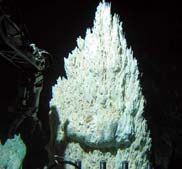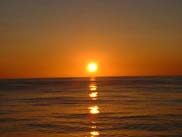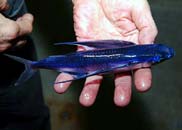|
|
|||||||||||||||||||||||||||||||||||||||||||||||||||||||||||||||||||||||||||||||||||||||||||||||||||
 |
|||||||||||||||||||||||||||||||||||||||||||||||||||||||||||||||||||||||||||||||||||||||||||||||||||
It was just after lunch yesterday when I heard Deb Kelley exclaim “We sure are lucky people.” We were maneuvering around an extinct carbonate spire and although I heard her say this, I was a bit too busy to ponder what her simple statement really meant. She had said the same thing earlier in the dive and during the first dive of the cruise as well. Each time the words came out I was focused on something outside of Alvin, too preoccupied with piloting to notice their significance.
But like an old song that eventually finds its way out of the corners of my mind, her words returned that evening to occupy my resting thoughts. Sitting in my stateroom, watching the fifth re-run of one of the ship’s DVD’s (‘Goodfellas’ or ‘Matrix’, I can’t recall), what she said in the sub really sank in. We truly are lucky to be here, in the Mid-Atlantic, exploring areas of the earth that have never been seen before. For many of the scientists I meet on the Atlantis, it seems that the cruises are a welcome chance to leave the lab, travel to rather exotic locations and perform their long thought out fieldwork. It’s a chance to get out from under the fluorescent lights and get outside into the fresh air and sunshine. For myself and the other members of the Alvin roup and Atlantis crew, this is our home and office for eight months of the year. Although it may seem that it would be easy to take this all for granted, let it all become routine, I still find it a regular occurrence to experience moments where I have to remind myself that I actually am getting paid for this. Thursday was one of those days. On days with scheduled dives the Alvin group starts preparing the sub at around six o’clock in the morning. That means at about five thirty, I find myself rolling out of my bunk to the sound of my watch alarm’s annoying beep. (I still don’t know how many beeps it has before the alarm stops but it always seems like too many). Right above me is my roommate, Noel, jumping out of his bed to the sound of his own annoying beep-beep alarm. It’s our morning dueling alarm clock routine. Ten minutes later, after a do-si-do around the single sink in the room, we’re off to work, both of us with the ‘it’s too early’ bleary-eyed looks on our faces. But every morning I get to see the sunrise and no two are ever the same. Thursday morning’s sunrise is easy to remember. It was one of those mornings where a line of low hanging cumulous clouds stretched across the horizon and the sun, just beginning to rise, painted the sky blood red with streaks and splashes of burnt orange. It was magnificent.
It's the simple, subtle things out here that really magnify the whole experience, that make Deb Kelley’s words ring true. Different days have different gifts if you’re just willing to look for them. Random visits by dolphins or whales, the occasional water spout or wayward flying fish, the color of the water at 60 meters on ascent, the thousands of bioluminescent critters that escort us to the bottom, the chance to see a new vent site or never seen seascape, the chance to be an active participant in scientific exploration (without all those long years pursuing a PhD), these are just a few of the regular day to day events that have made this truly the experience of a lifetime.
Thursday’s sunset was just as beautiful. Standing on the starboard side of the aft deck of Atlantis I gazed at a sea as flat as a lake. The sky was slowly settling down toward nighttime and had taken on a hue of purple that almost sighed. It was as if the day just didn’t want to quit, that it wanted to squeeze one last drop of color out of its depths before finally giving in to the inevitability of night. I remember thinking that many people never get the chance to see it this way, to think that in the middle of the Atlantic it could be so serene and peaceful. You’re right, Deb, we truly are lucky. Thanks for the reminder. |
|||||||||||||||||||||||||||||||||||||||||||||||||||||||||||||||||||||||||||||||||||||||||||||||||||



